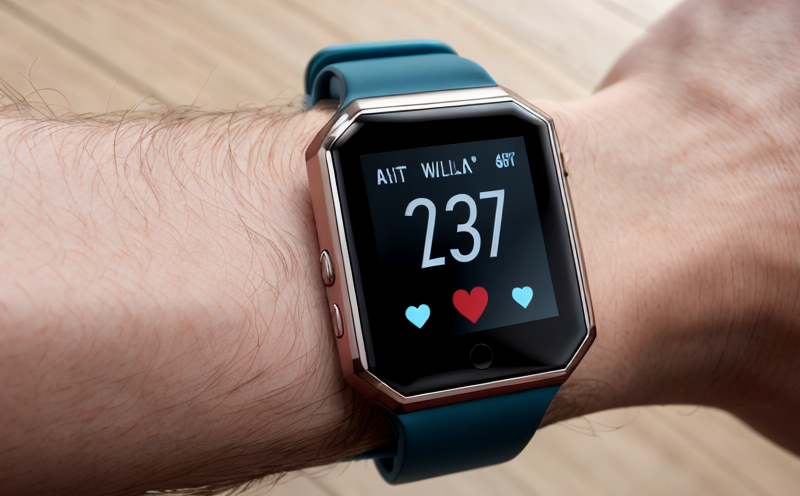NFC Security and Performance Testing in Health Wearables
The use of Near Field Communication (NFC) technology in health wearables has been on a steady rise. This innovative technology enables secure, wireless communication between devices, which is particularly valuable for the healthcare sector. NFC security testing ensures that all data transmitted is protected against unauthorized access and manipulation. In this context, our specialized laboratory provides comprehensive testing services to ensure your wearable device meets international standards.
Our testing process begins with a detailed analysis of your product's NFC components. This includes identifying the specific types of NFC tags or chips used in your design. Understanding these components is crucial for determining appropriate test protocols that align with industry best practices and regulatory requirements. We then move on to evaluating the security features implemented within the device, such as encryption methods and authentication processes.
The next step involves conducting performance tests under various conditions to assess how well the NFC system functions in real-world scenarios. This includes stress testing for durability, interoperability checks with other devices, and assessing power consumption during active communication sessions. By simulating different environmental factors like temperature changes or electromagnetic interference (EMI), we can identify potential weaknesses that need addressing.
Our team also focuses on ensuring compliance with relevant international standards such as ISO/IEC 14443 for contactless smart card technology and EN 302 200 for NFC operation in wireless communications. These standards provide guidelines to help manufacturers ensure their products perform reliably across diverse environments while maintaining high levels of security.
In addition, we offer assistance with regulatory compliance by providing documentation that supports the successful passage through certification processes required by governing bodies like CE marking or FDA approval. With our expertise and resources, you can rest assured knowing your wearable device is thoroughly tested for both its security features and overall performance before reaching market readiness.
Why It Matters
The importance of NFC security testing in health wearables cannot be overstated given the sensitive nature of healthcare data. A compromised NFC system could lead to severe consequences such as unauthorized access to personal medical records or even life-threatening situations if critical information is tampered with during transmission.
- Ensures patient privacy and data protection
- Promotes trust among users regarding the security measures in place
- Aids in maintaining regulatory compliance ensuring smoother market entry
- Reduces risks associated with potential vulnerabilities that could exploit sensitive information
- Enhances brand reputation by demonstrating commitment to quality and safety standards
By investing in robust NFC security testing early on in the development process, manufacturers can avoid costly recalls later down the line. Furthermore, meeting stringent security requirements helps establish credibility within competitive markets where consumers are increasingly demanding secure solutions for their personal health information.
Quality and Reliability Assurance
Our commitment to excellence extends beyond just providing technical expertise; it includes ensuring every aspect of your wearable device undergoes rigorous quality assurance measures. From initial concept stages through final product release, we work closely with you to identify key areas where NFC security and performance testing will add value.
During the design phase, our engineers collaborate with yours to incorporate best practices into the architecture of your wearable device. This ensures that any necessary modifications or enhancements can be made efficiently without compromising on overall functionality. Once development is complete, we begin executing our standardized test procedures which cover all relevant aspects of NFC technology.
For example, one crucial area we focus on is ensuring seamless interoperability between different devices connected via NFC. We simulate real-world usage scenarios to verify that your wearable can communicate effectively with other healthcare equipment such as hospital management systems or remote monitoring platforms. Additionally, we test for reliability by subjecting the device to prolonged periods of operation under varying conditions.
In summary, our quality and reliability assurance processes are designed to give you peace of mind knowing that your health wearables not only meet but exceed industry expectations. Through close collaboration throughout each stage of development and deployment, we help create products that are both secure and dependable.
International Acceptance and Recognition
The importance of international acceptance cannot be overstated when it comes to NFC security and performance testing in health wearables. Compliance with recognized standards such as ISO/IEC 14443 and EN 302 200 ensures that your product is accepted across borders, facilitating easier market entry and broader distribution.
- ISO/IEC 14443: This standard defines the physical layer for contactless smart cards, including NFC technology. Adherence to this specification guarantees compatibility with a wide array of devices worldwide.
- EN 302 200: Developed by European Telecommunications Standards Institute (ETSI), this document specifies requirements for NFC operation in wireless communications. By following these guidelines, manufacturers can ensure their products function correctly within the EU market and beyond.
By ensuring your wearable meets these standards during our rigorous testing process, you position yourself favorably for global sales opportunities. Countries like Australia, New Zealand, and various European nations have implemented strict regulations regarding healthcare data security, making compliance essential for successful product launch in those regions.





